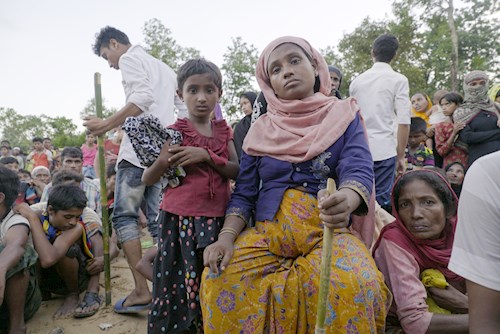A UN special reporter has warned that humanitarian conditions in Bangladeshi camps hosting Rohingya refugees will get worse over the next few months. Plans to resettle the Rohingya people back in Myanmar have also stirred up fear and resentment among the inhabitants of the Cox’s Bazar camps.
Refugees have fled what the UN has dubbed ‘ethnic cleansing’ in Myanmar. Their homes and farmland have been burned to the ground, and many have seen loved ones murdered before their eyes. Countless women and girls have been the victims of brutal sexual violence. Without any promises of protection, it’s easy to see why the Rohingya refugees are terrified at the prospect of returning home.
Donate to our Rohingya Emergency Appeal

With the Bangladeshi monsoon season approaching, the makeshift camps in Cox’s Bazar are in grave danger. There’s a high risk of flooding and landslides, causing thousands of tents and makeshift shelters to be swept away. It’s likely that the ground will turn into a wet slurry, mixed with mud, refuse and untreated human waste due to a lack of sanitation facilities. The UN has reported that they are expecting a huge number of casualties.
Crowded conditions in the camp and the imminent heavy rainfall will create an ideal environment in which disease can spread. There are fears that an outbreak of diphtheria or cholera would be impossible to contain and could spread to the wider population of Bangladesh.
Since the Myanmar military responded to insurgent attacks in September 2017 with a violent crackdown, more than 650,000 Rohingya people have fled the country. Human Appeal is on the ground in both Bangladesh and Myanmar, providing essential aid to families who have lost everything.
Thanks to the contributions of our generous donors, we provided emergency relief to 20,660 Rohingya refugees and much-needed medical aid to another 45,000 Rohingya people last year.
In the camps of Cox’s Bazar, we have set up a medical clinic that serves between 100 and 250 people every day. It’s staffed by qualified doctors and nurses, and equipped with high-quality medical supplies. Healthcare staff at the clinic work tirelessly to ensure that every last person is treated. Many refugees sustained horrific injuries in their flight from Myanmar, including children who have been crippled by bullet wounds and may be permanently disabled.
Our Water and Sanitation programme has offered employment opportunities for Rohingya refugees, allowing them to support their families. It also provides vital education, particularly for new mothers who need to know how to keep their little ones healthy through good hygiene practices.
We are regularly distributing food and non-food items, and our team has built water wells and established a child-safe area for 1,500 Rohingya children who need a secure place in which to play.
As the dangerous monsoon season approaches, it’s more important than ever that we do not turn our backs on the Rohingya refugees in their hour of need. Adverse weather conditions will have a devastating impact on the makeshift camps of Cox’s Bazar and could shatter the small amount of stability that some families have managed to attain.
Just £65 will buy enough nutritious food to keep a family of four well-fed for a whole month. For £100, you can provide a desperate family with emergency food rations, clean water and medical supplies, helping them to survive even when the monsoon rains come.
For £250, you can help us set up vital sanitation facilities to prevent the spread of diseases like cholera and diphtheria, and provide education and psychological care for children who have witnessed shocking acts of violence. By investing in care for little ones, we can give them their childhoods back and set them on a better path towards a bright future.
You can save a precious life today.